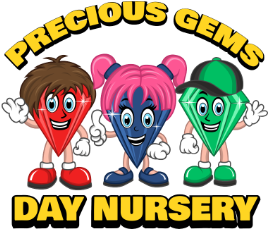The Role of Play in Early Learning: How Nurseries Foster Development
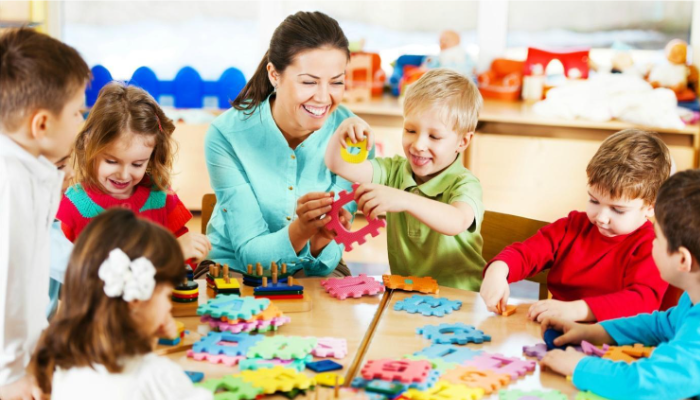
Play serves as a driver for the growth and development of children. In day care centres teachers are utilising the enchantment of play to support the physical well being of young ones. Whether they are constructing block structures or inventing make believe realms kids are establishing the groundwork for learning during their daily adventures. This guide explores the significance of play, in education and how day care facilities are crafting settings that seamlessly blend playtime with educational pursuits.
Introduction: Why Play Matters in Early Childhood
Picture a child building a towering block castle or pretending to be a superhero. They’re not just having fun; they’re laying the groundwork for future learning. Play is the language of childhood, a universal way for kids to explore, create, and understand their world.
At Precious Gems Nursery, we’ve seen first hand how play ignites curiosity and fuels learning. It’s like a secret ingredient that makes education exciting and effective. When children play, they’re not just passing time – they’re developing critical skills that’ll serve them well into adulthood.
Think about it: when a child plays, they’re not just moving toys around. They’re problem-solving, communicating, creating, and so much more. It’s like they’re little scientists, testing theories about how the world works. And the best part? They’re having a blast while doing it!
Play isn’t just a way to fill time between “real” learning activities. It is a real learning activity. It’s how children make sense of their world, try on different roles, and figure out how things work. At Precious Gems Nursery, we see play as the foundation of all learning.
Understanding Play-Based Learning
So, what exactly is play-based learning? It’s an approach that puts play at the centre of early childhood education. Instead of formal lessons, kids learn through hands-on experiences, exploration, and good old-fashioned fun.
Here’s a quick breakdown of the types of play we encourage:
- Imaginative play: Dress-up corners and pretend kitchens
- Physical play: Outdoor games and obstacle courses
- Social play: Group activities and sharing toys
- Constructive play: Building blocks and puzzles
- Exploratory play: Sensory bins and nature walks
The benefits? They’re huge. Play-based learning boosts problem-solving skills, creativity, and social development. It’s like a super-charged learning engine, and at Precious Gems Nursery, we’re all about revving it up.
But let’s break it down even further. When a child engages in imaginative play, they’re not just playing pretend. They’re developing narrative skills, exploring different perspectives, and learning to think symbolically. When they’re building with blocks, they’re not just stacking toys. They’re learning about spatial relationships, developing fine motor skills, and even getting early maths concepts.
And social play? It’s a crash course in human interaction. Kids learn to negotiate, to take turns, to read social cues. They figure out how to work as part of a team and how to lead. These are skills that’ll serve them well throughout their lives, from the classroom to the boardroom.
At Precious Gems Nursery, we don’t just provide opportunities for play. We create an environment where play is valued, encouraged, and seen for what it truly is: the work of childhood.
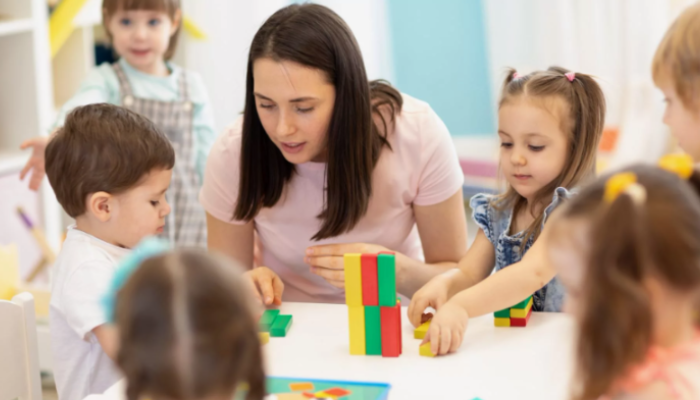
How Nurseries Implement Play-Based Learning
At Precious Gems Nursery, we strike a balance between structured and unstructured play. Sometimes we’ll guide activities, like a themed craft project. Other times, we’ll step back and let the kids take the lead, watching as they create their own games and stories.
Here’s a typical day in our play-based learning environment:
- Morning circle time: We sing songs and share stories
- Free play: Kids choose their activities, from building blocks to painting
- Outdoor exploration: Nature walks and playground time
- Guided activity: A science experiment or cooking project
- Quiet time: Reading books or working on puzzles
Our educators? They’re not just supervisors; they’re play partners and guides. They ask open-ended questions, offer gentle support, and know when to step back and let the magic of play unfold.
But how do we make sure that play is truly educational? It’s all in how we set up the environment and how we interact with the children. We might set up a grocery store dramatic play area, for example. This isn’t just about playing shop. It’s an opportunity to practise maths skills (counting out change), literacy (reading labels), and social skills (interacting with “customers”).
Or take our outdoor time. It’s not just about burning off energy. We might go on a bug hunt, turning it into a lesson on nature and biology. We might collect leaves, turning it into an art project and a lesson on seasons. Every moment of play is a potential moment of learning.
And our educators are key to this process. They’re trained to recognize learning opportunities in play and to gently guide children towards discoveries. They might ask, “What do you think will happen if…?” or “How could we solve this problem?” These questions encourage critical thinking and problem-solving, all within the context of play.
The Impact of Play on Child Development
Cognitive Development
Play is like brain food for kids. It nourishes their minds and helps them grow smarter. At Precious Gems Nursery, we’ve seen shy kids become confident problem-solvers and daydreamers turn into focused learners, all through the power of play.
Case Study: Tommy’s Tower
Tommy was always quiet, rarely engaging with others. We introduced him to building blocks, and soon he was constructing elaborate towers. As he problem-solved to keep his creations standing, we noticed his confidence grow. He started explaining his “architectural designs” to other kids, his vocabulary expanding along with his social circle.
But cognitive development through play goes far beyond just problem-solving. When children play, they’re developing:
- Memory skills: Through games like memory matching or by remembering the rules of made-up games
- Language skills: Through storytelling, role-play, and conversations with peers
- Attention span: By engaging in activities they find interesting for longer periods
- Symbolic thinking: By using objects to represent other things in pretend play
- Executive function: By planning, organising, and making decisions in their play
At Precious Gems Nursery, we see cognitive development happening in real-time. A child figuring out how to build a stable block tower is developing spatial awareness and cause-and-effect understanding. A group of kids creating an imaginary world is exercising creativity and abstract thinking.
Social and Emotional Development
Play is where kids learn to be human. They figure out how to share, take turns, and handle big emotions. It’s like a mini-society where they can practise all the social skills they’ll need in life.
At Precious Gems Nursery, we use play to help kids:
- Build friendships
- Develop empathy
- Learn conflict resolution
- Boost self-confidence
But it goes even deeper than that. Through play, children learn:
- Emotional regulation: They learn to manage frustration when a tower falls or excitement when they succeed
- Perspective-taking: Role-play helps them understand different viewpoints
- Cooperation: Group games teach them to work together towards a common goal
- Leadership: Organizing games or assigning roles in pretend play develops leadership skills
- Resilience: Learning to cope with losing a game or when play doesn’t go as planned builds emotional resilience
We’ve seen countless examples of social and emotional growth through play. There was Lily, who learned to express her feelings through puppet play. And Max, who overcame his fear of new situations by role-playing different scenarios with friends.
Physical Development
From fine motor skills to gross motor coordination, play is a full-body workout for kids. Whether they’re threading beads or running obstacle courses, they’re building the physical skills they need for life.
Activity and Skill Developed:
- Painting: Fine motor control
- Climbing frames: Gross motor skills
- Dance parties: Coordination
- Play dough: Hand strength
- Ball games: Hand-eye coordination
But physical development through play isn’t just about motor skills. It also includes:
- Body awareness: Understanding where their body is in space
- Balance and stability: Through activities like hopping or walking on a balance beam
- Strength and endurance: Active play builds muscle strength and cardiovascular health
- Sensory integration: Play that engages multiple senses helps the brain process sensory information
At Precious Gems Nursery, we ensure our play spaces and activities support all aspects of physical development. Our outdoor area includes climbing equipment for gross motor skills, sand and water play for sensory development, and gardening activities for fine motor skills.
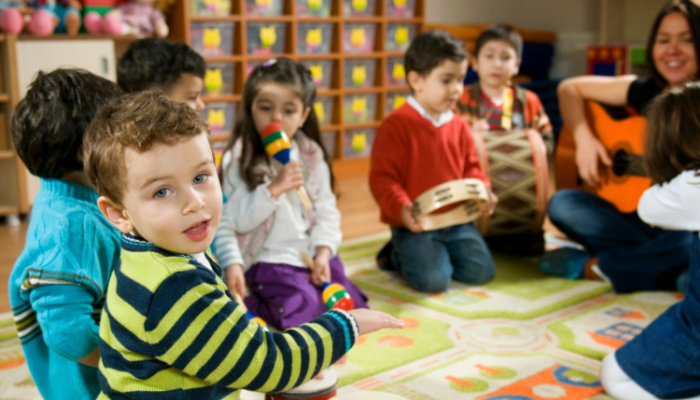
Play-Based Learning vs. Traditional Learning Methods
Now, you might be wondering: is all this play really better than traditional learning? The research says yes! Studies show that play-based learning leads to better academic outcomes, stronger social skills, and more creative thinking compared to traditional methods.
At Precious Gems Nursery, we’ve seen kids who struggle with formal lessons thrive in play-based activities. They’re more engaged, more motivated, and more likely to remember what they’ve learned.
Let’s break down the key differences:
Play-Based Learning:
- Child-led
- Hands-on experiences
- Integrated learning
- Process-focused
- Intrinsically motivated
Traditional Learning:
- Teacher-led
- Passive listening
- Subject-based
- Outcome-focused
- Extrinsically motivated
Research backs up the benefits of play-based learning. A study published in the journal “Early Childhood Research Quarterly” found that children in play-based programs showed greater improvement in self-regulation and academic skills compared to those in more academically focused programs.
But it’s not just about academic skills. Play-based learning also fosters:
- Creativity: Open-ended play encourages innovative thinking
- Love of learning: When learning is fun, children develop a positive attitude towards education
- Independence: Child-led play builds confidence and self-reliance
- Critical thinking: Problem-solving in play develops analytical skills
At Precious Gems Nursery, we believe that play-based learning provides a strong foundation for future academic success. We’re not just preparing kids for school; we’re preparing them for life.
Creating a Play-Friendly Environment in Nurseries
At Precious Gems Nursery, we’ve put a lot of thought into our play spaces. We believe the environment is the third teacher (after parents and educators), so we make sure it’s set up to inspire curiosity and learning.
Our play areas include:
- Cosy reading nooks
- Open spaces for active play
- Sensory stations for exploration
- Art corners for creative expression
- Nature-inspired outdoor play areas
We’re always rotating toys and materials to keep things fresh and exciting. And we make sure there’s a mix of familiar favourites and new challenges to keep kids engaged.
But creating a play-friendly environment is more than just setting up play stations. It’s about creating an atmosphere where play is valued and children feel safe to explore. Here’s how we do it:
- Flexible spaces: Our rooms can be easily rearranged to suit different types of play
- Child-sized everything: Furniture and equipment sized for little bodies promotes independence
- Open-ended materials: We provide “loose parts” that can be used in multiple ways to encourage creativity
- Natural elements: We bring nature inside with plants, shells, and other natural objects
- Cultural diversity: Our toys and materials reflect diverse cultures and family structures
We also consider the emotional environment. Our educators create a positive atmosphere where children feel secure enough to take risks in their play. We encourage questions, celebrate attempts (not just successes), and model a love of learning.
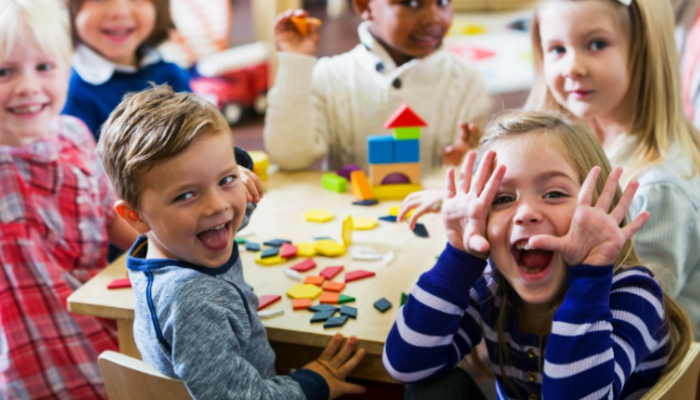
The Role of Technology in Modern Play-Based Learning
In today’s digital world, we can’t ignore technology. At Precious Gems Nursery, we take a balanced approach. We use tech tools to enhance learning, not replace traditional play.
For example, we might use a tablet to look up information during a nature walk or use interactive storytelling apps during quiet time. But we’re careful to balance this with plenty of hands-on, screen-free play.
Here’s how we integrate technology responsibly:
- Limited screen time: We follow guidelines from paediatric experts on appropriate screen time for young children
- Interactive use: When we do use screens, it’s for interactive, educational content, not passive viewing
- Tech as a tool: We teach children to see technology as one of many tools for learning and creating
- Digital literacy: We introduce basic concepts of how technology works and how to use it safely
- Enhancing, not replacing: Tech is used to enhance traditional play, not replace it
For instance, after building a physical block tower, we might use a simple coding app to program a robot to navigate around it. Or we might use a digital microscope to examine leaves we collected during outdoor play. At Precious Gems Nursery, we believe in preparing children for the digital world they’ll grow up in, while still prioritising hands-on, real-world play experiences.
Overcoming Challenges in Implementing Play-Based Learning
Let’s be real – play-based learning isn’t always easy to implement. Some parents worry their kids aren’t learning “real” skills. Others are concerned about academic readiness.
At Precious Gems Nursery, we address these concerns head-on. We educate parents about the benefits of play-based learning and show them how play supports academic skills. We also make sure our staff is well-trained in play-based teaching methods.
Here are some common challenges and how we address them:
- Parental concerns: We hold parent education nights and share regular updates on children’s learning through play
- Balance with academics: We show how play naturally incorporates early literacy and maths concepts
- Staff training: We provide ongoing professional development in play-based teaching methods
- Assessment: We use observation-based assessment tools to track children’s progress
- Time constraints: We integrate learning into all aspects of the day, not just designated “lesson” times
We also encourage parents to get involved. We might send home “play prompts” – simple ideas for playful learning at home. Or we might have a family play day, where parents can come in and experience our play-based approach first-hand.
Measuring the Success of Play-Based Learning in Nurseries
How do we know if play-based learning is working? At Precious Gems Nursery, we look for signs like:
- Increased problem-solving skills
- Better social interactions
- More creative thinking
- Improved language skills
- Greater independence and confidence
We use observational assessments rather than formal tests, tracking each child’s progress over time. And the results? They speak for themselves. We see our little learners blossom into curious, confident, and capable individuals.
Our assessment process includes:
- Regular observations: Educators keep detailed notes on children’s play and interactions
- Learning stories: We document significant moments of learning through play
- Portfolios: We collect samples of children’s work and photos of their play experiences
- Parent-educator conferences: We regularly share and discuss children’s progress with parents
- Developmental checklists: We use age-appropriate checklists to ensure children are meeting key milestones
But perhaps the most important measure of success is the joy we see in our children every day. When kids are excited to come to nursery, when they’re deeply engaged in their play, when they’re proud to share their discoveries – that’s when we know our play-based approach is working.
Conclusion: The Future of Play in Early Learning
As we look to the future, one thing is clear: play will continue to be a crucial part of early learning. At Precious Gems Nursery, we’re committed to staying at the forefront of play-based education.
We’re exploring new trends like:
- Nature-based play
- Mindfulness activities for kids
- STEAM-focused play experiences
But no matter what new methods emerge, our core belief remains the same: play is the heart of early learning. It’s how kids make sense of their world, develop crucial skills, and grow into the amazing individuals they’re meant to be.
At Precious Gems Nursery, we’re not just providing childcare – we’re nurturing the next generation of thinkers, creators, and problem-solvers. And we’re doing it all through the power of play.
As we move forward, we’ll continue to advocate for the importance of play in early childhood education. We’ll keep learning, innovating, and most importantly, playing. Because we believe that every moment of play is a moment of learning, growth, and joy.
We invite you to join us in this playful journey. Whether you’re a parent, an educator, or simply someone who cares about children’s development, remember: play isn’t just child’s play. It’s the foundation for a lifetime of learning and discovery.
FAQs About Play-Based Learning in Nurseries
-
What age group benefits most from play-based learning? While play is important for all ages, children from birth to age 5 benefit most from play-based learning approaches. This is a critical period for brain development, and play provides the perfect stimulus for growing minds.
-
How can parents support play-based learning at home? Provide open-ended toys, engage in pretend play with your child, and allow plenty of time for unstructured play. Remember, you don’t need expensive toys – household items can become amazing play materials with a little imagination!
-
Does play-based learning prepare children for formal schooling? Absolutely! Play-based learning develops crucial skills like problem-solving, creativity, and social interaction that set children up for success in formal education. It also fosters a love of learning that can last a lifetime.
-
How much time should be dedicated to play in nurseries? At Precious Gems Nursery, play is integrated throughout the day. We aim for a mix of free play and guided play activities. Ideally, most of a child’s day should involve some form of play, as it’s through play that children learn best at this age.
-
Can play-based learning help children with special needs? Yes, play-based learning can be especially beneficial for children with special needs. It allows for individualised learning at each child’s own pace and can be adapted to suit various learning styles and abilities. Play also provides a natural, low-pressure environment for developing social and communication skills.
-
How do nurseries ensure that children are actually learning through play? Skilled educators observe and guide children’s play, introducing concepts and asking questions that extend learning. They also plan play environments and activities that target specific developmental areas while allowing for child-led exploration.
-
Is there a difference between free play and guided play in nurseries? Yes, free play is entirely child-directed, while guided play involves some adult input. Both are important. Free play encourages independence and creativity, while guided play allows educators to introduce specific concepts or skills through playful activities.
-
How does play-based learning support language development? Play provides numerous opportunities for language use and development. Through imaginative play, storytelling, and interactions with peers and adults, children naturally expand their vocabulary and practice communication skills.
-
What role does outdoor play have in nursery settings? Outdoor play is crucial. It supports physical development, provides sensory experiences, encourages exploration of the natural world, and often involves different types of play than indoor environments. At Precious Gems Nursery, we prioritise daily outdoor play, weather permitting.
- How can I tell if a nursery truly embraces play-based learning? Look for a nursery with varied play areas, engaged staff who interact with children during play, a balance of free and guided play activities, and an emphasis on the process of play rather than just end products. Ask about their philosophy on play and how they incorporate it into their daily routines.
